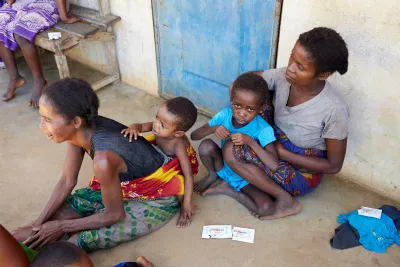Humanitarian actors look after the population to fight malnutrition
In the Great Southeast of Madagascar, health agents supported by community agents and other actors are working on the frontlines to save the lives of children suffering from acute malnutrition.

In the village of Manambotra in south-eastern Madagascar, life is slowly restarting, a year after the devastating impacts of cyclones Batsirai and Emnati, which struck the region in February 2022. Under a cloudy sky, Herisoa Albertine gets ready for a meeting with the women of the village, who have been informed the week before. Albertine, a community nutrition agent, has set up a small space between the wooden houses to welcome the participants. More than a hundred young children accompany their mothers.
With all eyes on the ingredients spread out on the table, Albertine begins awareness-raising activities. “As you can see here, you should use varied and diversified foods to feed yourselves and your children. Breastfeeding is also essential for the development of your baby”, she insists during the session, which lasts about 30 minutes.
At Albertine’s side, Mario, a community instructor from the regional nutrition office, provides support in conducting these activities. “We will start weighing and measuring the arm circumference of your children”, he announces energetically. The two colleagues work tirelessly while Olidée, alongside three other mothers, starts cooking the ingredients that community members brought. She volunteered for this task because her child is among those who are malnourished.
“Right now, we are treating around 185 cases of moderate acute malnutrition among children below the age of five. We started providing care at the community level in November 2022 and the number of cases keeps rising because of the devastating effects the cyclones have on agriculture. We were planning to treat moderate cases at the community nutrition center. But we don’t have a space to store the resources safely, so we distribute the treatment at the health center, which stocks them”, Albertine explains.
According to projections by humanitarian actors, 115,000 children will require a treatment against acute malnutrition in 2023 in the Great Southeast of Madagascar.

© UNICEF/UN0794254/Andriantsoarana
Albertine weighs two-year-old Franckline, the daughter of Olidée, who suffers from moderate acute malnutrition.

© UNICEF/UN0794202/Andriantsoarana
Olidée, a volunteer cook whose daughter is malnourished, prepares the food for the cooking demonstration.

© UNICEF/UN0794264/Andriantsoarana
Olidée receives the ready-to-use supplementary food to treat the moderate acute malnutrition of her child.
Fighting together
Actors from the nutrition sector called for 13 million dollars in funding to fight against malnutrition in the three regions of the Southeast. In February, only 11 per cent of these financial needs had been met, while cyclone Freddy swept these same areas, which are especially vulnerable to the effects of climate change and the rise in extreme climate events. At the same time, UNICEF launched a global call, along with four other United Nations agencies, to highlight the necessity of immediate action to protect the most vulnerable children in the 15 countries hardest hit by an unprecedented food and nutrition crisis, including Madagascar.
Albertine and Mario are about to finish the screening when they detect a form of severe malnutrition in six-month-old Merlino. Albertine immediately takes him to the health center, just a few meters away, so that he can receive the adequate treatment: ready-to-use therapeutic food. She also confirms the results of the screening with the health agent.
A surge in malaria cases has also been observed at the health center and attributed to stagnant waters. “Yesterday, 58 out of 63 people tested positive for malaria. This aggravates malnutrition in children whose health is already fragile”, explains Marcelin, a health agent at the center.
“The meal is ready”, Olidée whispers to Albertine when she returns. Just for a short while, the participants forget about their daily concerns while they share a meal specifically tailored to the needs of young children. The session ends on a positive note before everyone leaves to go home.

© UNICEF/UN0794688/Andriantsoarana
Zoronalia (in the blue T-shirt), who tested positive for malaria, sits in front of the health center of south Manambotra.

© UNICEF/UN0794278/Andriantsoarana
A child sleeps after eating the meal prepared during the cooking demonstration.

© UNICEF/UN0794722/Andriantsoarana
Albertine visits the home of a mother whose child has not gained weight to provide advice.



